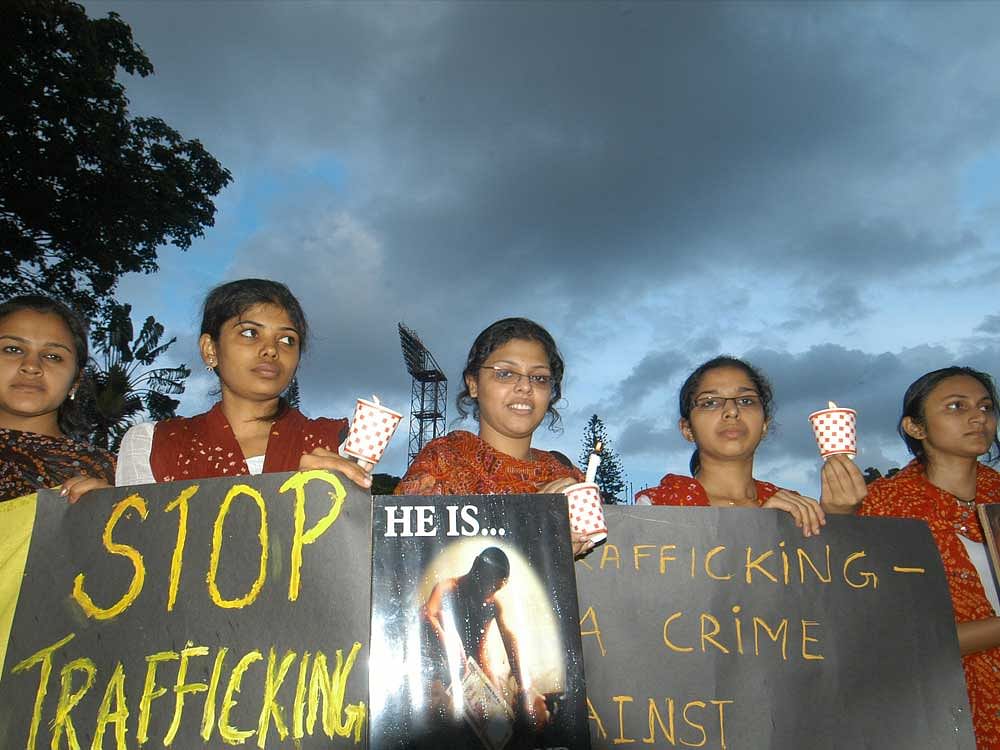Seasonal employment, child marriage make women vulnerable to trafficking
Last Updated IST

The study 'Adolescence at the Border' by anti-human trafficking NGO Justice and Care in association with Border Security Force (BSF) said human trafficking is a highly organised crime operating within source and destination areas. DH file photo
Seasonal employment, child marriage and school drop out rate are among the reasons making women and girls vulnerable to trafficking on the Indo-Bangladesh border, according to a study.
The study 'Adolescence at the Border' by anti-human trafficking NGO Justice and Care in association with Border Security Force (BSF) said human trafficking is a highly organised crime operating within source and destination areas.
It said effective collaboration of security agencies like BSF and state police with NGOs is the need of the hour and this needs to be nurtured for best results.
"Seasonal employment, child marriage, school drop out rate, crimes against children such as abuse and eve teasing were found to be extremely high in these villages. These are all factors that contribute to making women and girls vulnerable to trafficking and other violent crimes," the study said.
The study was conducted in eight villages around two check-posts at the Indo-Bangladesh border in North 24 Parganas district of West Bengal. In these villages, 639 adolescent girls were chosen for interviews.
It said one of the recurrent themes that came during the study was the perception of inadequate security for women and fear of outsiders. Though most of them felt safe within the family, it said, they feared to be a victim of crime.
The study recommended adoption of non-traditional security approaches to border management with increased focus on human security and human rights. It has to be victim-centric and child-friendly spaces at border outposts.
Commenting on the study, BSF Director General K K Sharma said the unique aspect of the study is the fact that it incorporates critical views of individuals vulnerable to trafficking along the border as well as the efforts made by the BSF in dealing with the issue of cross-border trafficking.
"While systems around human rights responses to illegal migrants had been advocated, more focus was required around victims of trafficking and arrests of their touts through correct detection," said lawyer Adrian Phillips of Justice and Care.
The study 'Adolescence at the Border' by anti-human trafficking NGO Justice and Care in association with Border Security Force (BSF) said human trafficking is a highly organised crime operating within source and destination areas.
It said effective collaboration of security agencies like BSF and state police with NGOs is the need of the hour and this needs to be nurtured for best results.
"Seasonal employment, child marriage, school drop out rate, crimes against children such as abuse and eve teasing were found to be extremely high in these villages. These are all factors that contribute to making women and girls vulnerable to trafficking and other violent crimes," the study said.
The study was conducted in eight villages around two check-posts at the Indo-Bangladesh border in North 24 Parganas district of West Bengal. In these villages, 639 adolescent girls were chosen for interviews.
It said one of the recurrent themes that came during the study was the perception of inadequate security for women and fear of outsiders. Though most of them felt safe within the family, it said, they feared to be a victim of crime.
The study recommended adoption of non-traditional security approaches to border management with increased focus on human security and human rights. It has to be victim-centric and child-friendly spaces at border outposts.
Commenting on the study, BSF Director General K K Sharma said the unique aspect of the study is the fact that it incorporates critical views of individuals vulnerable to trafficking along the border as well as the efforts made by the BSF in dealing with the issue of cross-border trafficking.
"While systems around human rights responses to illegal migrants had been advocated, more focus was required around victims of trafficking and arrests of their touts through correct detection," said lawyer Adrian Phillips of Justice and Care.
